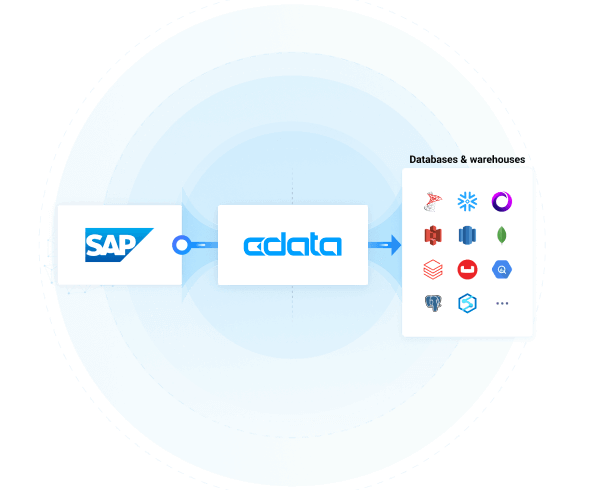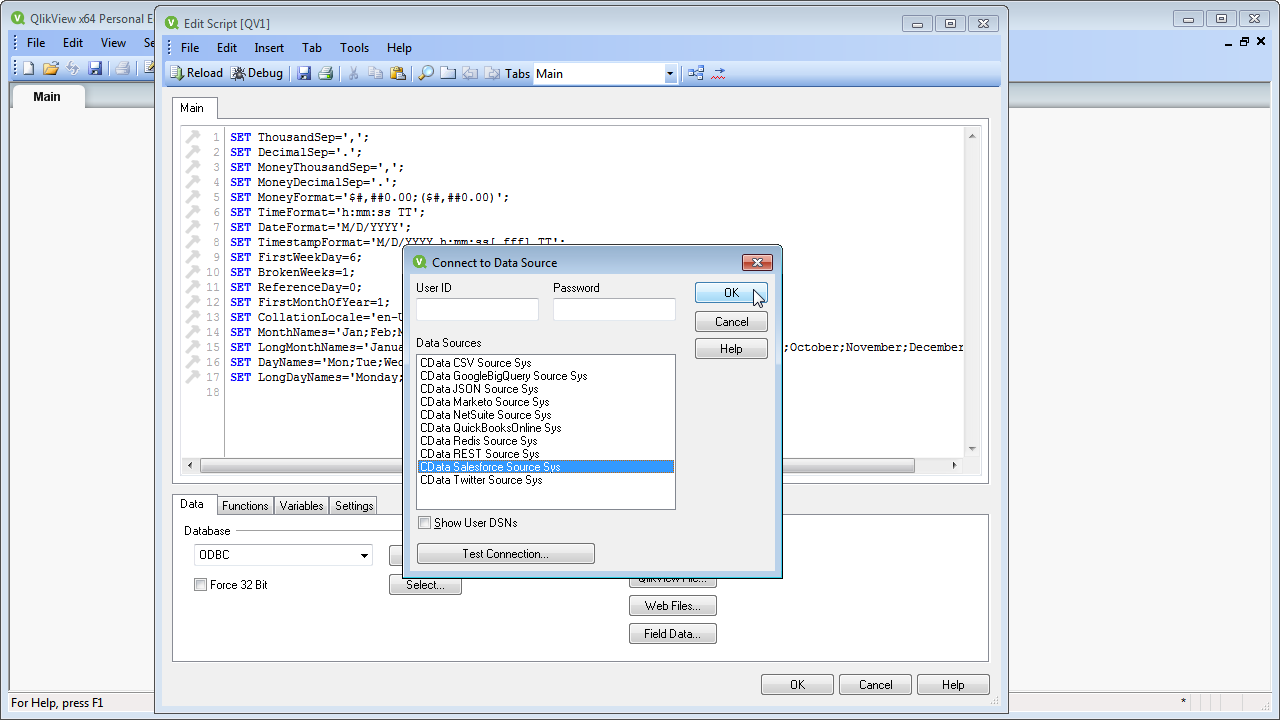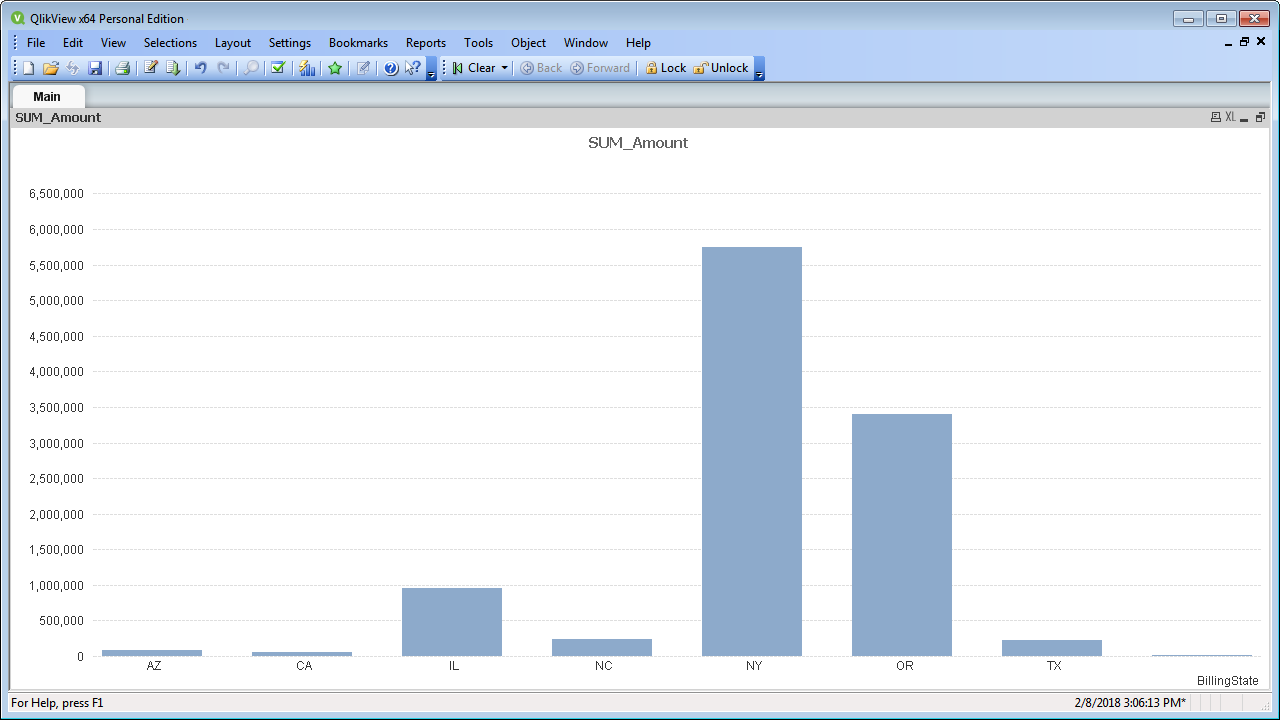Discover how a bimodal integration strategy can address the major data management challenges facing your organization today.
Get the Report →Connect to and Query Dynamics GP Data in QlikView over ODBC
Create data visualizations with Dynamics GP data in QlikView.
The CData ODBC drivers expand your ability to work with data from more than 200 data sources. QlikView is a business discovery platform that provides self-service BI for all business users in an organization. This article outlines simple steps to connect to Dynamics GP data using the CData ODBC driver and create data visualizations in QlikView.
The CData ODBC drivers offer unmatched performance for interacting with live Dynamics GP data in QlikView due to optimized data processing built into the driver. When you issue complex SQL queries from QlikView to Dynamics GP, the driver pushes supported SQL operations, like filters and aggregations, directly to Dynamics GP and utilizes the embedded SQL engine to process unsupported operations (often SQL functions and JOIN operations) client-side. With built-in dynamic metadata querying, you can visualize and analyze Dynamics GP data using native QlikView data types.
Connect to Dynamics GP as an ODBC Data Source
If you have not already, first specify connection properties in an ODBC DSN (data source name). This is the last step of the driver installation. You can use the Microsoft ODBC Data Source Administrator to create and configure ODBC DSNs.
To authenticate set the User and Password connection properties.
To connect set the URL to the Web services endpoint; for example, http://{servername}:{port}/Dynamics/GPService. Additionally, set CompanyId; you can obtain this value in the company setup window: Click Tools -> Setup -> Company.
By default, data summaries are not returned to save performance. Set LookupIds to true to return details such as line items; however, note that entities must be retrieved one at a time.
When you configure the DSN, you may also want to set the Max Rows connection property. This will limit the number of rows returned, which is especially helpful for improving performance when designing reports and visualizations.
Populate a Chart with Dynamics GP Data
The steps below supply the results of an SQL query to a visualization in QlikView. In this article, you will create a bar chart with the query below:
SELECT CustomerName, TotalAmount FROM SalesInvoice
- Click File -> Edit Script (or click the Edit Script button in the Toolbar).
- On the Data tab, select ODBC in the Database menu and click Connect.
![Connecting to an ODBC data source.]()
- Select the DSN (CData DynamicsGP Sys) in the resulting dialog.
![Selecting a DSN (Salesforce is shown).]() A command like the following is generated:
A command like the following is generated:
ODBC CONNECT TO [CData DynamicsGP Sys]; - Enter the SQL query directly into the script with the SQL command (or click Select to build the query in the SELECT statement wizard).
SQL SELECT CustomerName, TotalAmount FROM SalesInvoice;Where possible, the SQL operations in the query, like filters and aggregations, will be pushed down to Dynamics GP, while any unsupported operations (which can include SQL functions and JOIN operations) will be managed client-side by the CData SQL engine embedded in the driver.
![A script that connects and executes an SQL query. (Salesforce is shown.)]()
- Close the script editor and reload the document to execute the script.
- Click Tools -> Quick Chart Wizard. In the wizard, select the chart type. This example uses a bar chart. When building the chart, you have access to the fields from Dynamics GP, typed appropriately for QlikView, thanks to built-in dynamic metadata querying.
- When defining Dimensions, select CustomerName in the First Dimension menu.
- When defining Expressions, click the summary function you want and select TotalAmount in the menu.
Finish the wizard to generate the chart. The CData ODBC Driver for Dynamics GP connects to live Dynamics GP data, so the chart can be refreshed to see real-time changes. Live connections are possible and effective, thanks to the high-performance data processing native to CData ODBC Drivers.
![A chart populated with the results of a query. (Salesforce is shown.)]()






 A command like the following is generated:
A command like the following is generated:


